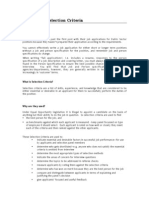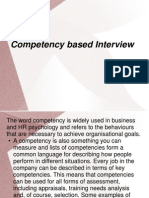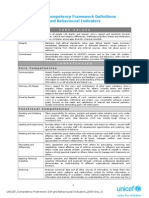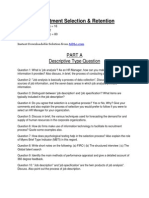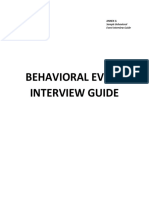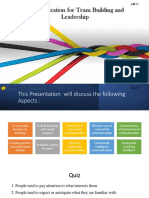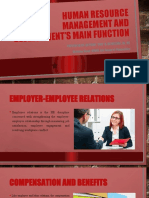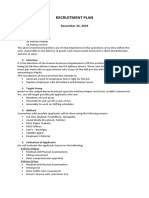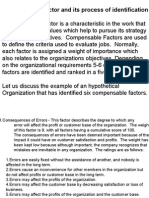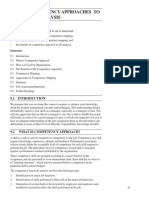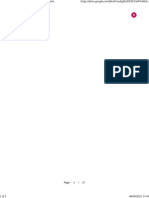0 ratings0% found this document useful (0 votes)
170 views84 pagesCompetency-Based Interview Questions PDF
Uploaded by
RaghdaCopyright
© © All Rights Reserved
We take content rights seriously. If you suspect this is your content, claim it here.
Available Formats
Download as PDF or read online on Scribd
0 ratings0% found this document useful (0 votes)
170 views84 pagesCompetency-Based Interview Questions PDF
Uploaded by
RaghdaCopyright
© © All Rights Reserved
We take content rights seriously. If you suspect this is your content, claim it here.
Available Formats
Download as PDF or read online on Scribd
You are on page 1/ 84
malas a
er et ein ae
2) ee
iL
2 ;
What are
What are
What are
Abate : ejantel-
The term "competency" refers to a combination
of skills, attributes and behaviours that are directly
related to successful performance on the job.
Core competencies are the skills, attributes and
behaviours which are considered important for all
staff of the Organization, regardless of their
function or level.
Managerial competencies are the skills, attributes
and behaviours which are considered essential
for staff with managerial or supervisory responsibilities.
Competencies
Competencies
Competencies
Core and managerial competencies are not specific
to any occupation. One could demonstrate the
competency for "teamwork" or "client orientation",
for example, in performing any job. Specific
technical competencies are not included in the model
of United Nations competencies for the future.
To complement the core competencies, individual
departments may choose to define functional
competencies related to their respective areas of
work. This guide focuses on the use of competencies
for interviewing and selecting candidates.
Competencies
Competencies
Competencies
Competencies
Competencies
Competencies
Competencies
Competencies
* Integrity * Professionalism * Respect for Diversity
* Communication * Teamwork * Planning and Organizing * Accountability
* Creativity * Client Orientation * Commitment to Continuous Learning
* Technological Awareness
* Leadership © Vision * Empowering Others ¢ Building Trust
* Managing Performance « Judgement/Decision-making
For more on the United Nations competencies,
see United Nations Competencies for the Future
(OHRM, November 1999), and
the Secretary-General’s Bulletin
“Organizational Core and Managerial Competencies"
(ST/SGB/1999/13).
miei ° = A
* Each of the United Nations competencies chosen
has a comprehensive series of sample questions and
associated prompts that may provide useful information
about each competency area.
* Choose up to five competencies to focus on during
the interview (research indicates that more than
five key areas are difficult to assess thoroughly and
accurately in an interview).
* You may wish to make piceseeries of the appropriate
pages in the Guide (including the Assessment Sheet
at the end) for note-taking.
Guidelin
Guidelines
Guidelines
Guidelines
s
Review the sample questions and select those you
feel would be most useful or modify them as required.
Ask one question at a time, beginning with the
first in a series and following up with probes to
elicit further information.
Listen carefully to the candidate and assess his or
her answers against the associated positive and
negative indicators.
The Assessment Sheet at the end of this Guide
contains notes pages for writing notes during and
after the interview.
Immediately after the interview, complete the
ratings on the Assessment Sheet.
Allow time to cover any other areas and to give the
candidate the opportunity to ask you questions.
Guidelines
Guidelines
Guidelines
Gaitidalinac
The interview provides two opportunities to obtain information:
listening to verbal statements and observing the candidate
(during the interview). Both are important and are interrelated.
Interviewers must take care that they do not get so involved
in asking questions that they do not listen to the answers.
Asymptom of this is when an interviewer asks a pre-arranged
question for information just volunteered by the candidate.
Apart from what the candidate actually says, there are other
non-verbal clues that may be observed and which can assist
in the assessment of a candidate. These can include pauses,
avoidance of areas, speed of response, digressions, platitudes,
failure to answer questions and displayed nervousness, etc.
fe
Make photocopies of the pages of the Guide you intend to use
for taking notes (including the Assessment Sheet at the end of
the Guide).
The interviewer must take notes during and immediately after the
interview. No one can remember all the examples of behaviour
brought out in an interview without taking notes. An Assessment
Sheet is provided for the interviewer's notes.
Most candidates expect notes to be taken. Some interviewers
may find it helpful to mention that they will be taking notes at the
beginning of the interview, while others do not mention it. It
should be done openly but not in such a way that the candidate
could see what is recorded.
The important thing to remember is not to let note-taking become
a signal to the candidate. For example, if the interviewer starts
taking notes every time a particular topic is mentioned the
candidate will eventually feel that this is an important area and
focus on it.
Conversely, note-taking immediately after the disclosure of an
embarrassing incident will indicate that this information is being
recorded and the rest of the interview may be inhibited.
When the candidate does or says something where immediate
note-taking would be inappropriate, the interviewer should
make a mental note but delay writing (until it will not affect the
information obtained). A few minutes later, when the conversation
has shifted to a neutral topic, or to an area where note-taking
would appear warranted (e.g., clarification of a job title), the
previously observed information should be recorded.
Non-verbal behaviour is replete with cultural and individual
factors. The following elements are based on research from a
large population of interviews in a variety of cultures and
languages. The following list is by no means exhaustive and
should be considered a general guide. Sensitivity of the
interviewer is the most important element.
Positioning: A distance of from three to five feet is best
suited to the selection interview. Less than three feet seems
to produce discomfort and uneasiness for most people,
while more than five feet becomes overly formal.
Posture: The interviewer's body needs to be directly oriented
towards the candidate. The interviewer should sit up and
slightly lean forward in order to show energy and a concern
to get on with the task in hand.
Eye Contact: Eye contact indicates when the interviewee has
finished talking, and interviewers who do not look sufficiently
at the candidate will find it harder to control and regulate
the interview comfortably.
Facial Expression: Facial expression should indicate interest
in what the candidate is saying. Try to ensure that the
expression conveys interest and avoid showing boredom,
irritation or disbelief.
* Head Movements: Head nodding and shaking can also provide
messages that, as the interviewer, you are keeping abreast of
what is being said, that such information is useful and that you
would like to hear more of it.
* Gestures: It is necessary for the interviewer to come across as
calm and confident in what he or she is doing and gestures
can help or hinder this. Clenched hands and entwined legs can
give the impression of nervousness. Hands can be used both
to give a greater emphasis to the interviewer's questions but
also, to a certain extent, to control or encourage the flow of
information coming from the candidate.
* Voice Production: Nervousness and under-confidence In the
interviewer can come across by talking too quickly or too
slowly—calmness by having a steady, reasonable, energetic
pace. Lack of interest could be the message received
if the tone of the interviewer's voice is monotonous without
different levels of pitch. Criticism and judgement, which
within the interview can be disabling, should not be conveyed
by the interviewer's tone of voice.
Key verbal signs of attention are:
Using open questions such as “tell me about ...” which shows interest
in knowing more about the candidate;
Simple responses, such as "mm", “yes”, “fine” and “I see”, which are
especially useful when the interviewee is recounting a lengthy experience;
Restating and summarizing, which show that the interviewer is
intent on getting an accurate picture of what the candidate is saying;
Perceptive probing and use of follow-up questions, which again
reinforce the interviewer's interest.
Below are some useful hints on how to ask additional questions:
Follow up question areas until it is clear what the candidate actually did.
Candidates will often skim over an important area. Be prepared
to take it up and ask for further explanation or probe for clarification.
Ask for clarification. If a candidate uses jargon that you do not
understand, do not let it go unexplained for fear of appearing uninformed
or offending the candidate.
* Find out the “why” behind actions. Do not assume stereotyped motives.
Interviewers must be careful not to project their values on candidates.
It is very easy for a highly motivated interviewer to assume a candidate
feels the same way.
Avoid collecting information not relevant to the specific competency.
Do not talk too much. A good interviewer controls without
monopolizing the conversation.
During the interview the interviewer should have noted examples of
situations, behaviours and outcomes for the different competencies and
have information concerning the candidate's work experience. The next
step is to classify and evaluate the information and assign a rating,
using the Assessment Sheet.
The key actions are:
*
Add to the notes and review the candidate's responses.
Summarize and classify the evidence for each competency covered
in the interview.
* Make a rating based on the positive and negative behaviour indicators,
using the rating system provided.
Make a final rating on the candidate and enter this on the
Assessment Sheet.
GoreValues
CoreValues
~ CoreValues
CoreValues
CoreValues
CoreValues
- CoreValues
~ CoreValues
Core Values
Core Values
Positive Indicators
Upholds the principles of the United Nations Charter.
Demonstrates the values of the United Nations, including
impartiality, fairness, honesty and truthfulness, in daily
activities and behaviours.
Acts without consideration of personal gain.
Resists undue political pressure in decision-making,
Does not abuse power or authority
Stands by decisions that are in the Organization's interest
even if they are unpopula,
Takes prompt action in cases of unprofessional or
unethical behaviour,
Sample Questions
Negative Indicators
* Interprets principles and ethics flexibly without justificatio
* Seeks personal gain
+ Compromises too readily when under pressure
+ Favours certain issues, individuals or groups in a subjective
* Is not reliable.
© May be dishonest
Tell me about the last time that you were faced with a professional or ethical
dilemma at work (in the recent past).
What was the specific situation?
How did you feel?
How did you resolve the dilemma?
When have you been asked to ‘bend the rules’ by a colleague or client?
How did you manage the situation?
What pressures were you under?
What factors did you have to consider?
What was the outcome?
Describe when you have had to choose between admitting a mistake
and maintaining credibility to a superior or client,
What did you do?
How did you decide what to do?
How does your approach compare to colleagues (others) who have faced this situation?
What would you do differently next time?
Tell me about a time you have observed others working in an unprofessional
or unethical manner.
What was unprofessional or unethical about their behaviour?
What did you specifically do about their behaviour?
What were the implications of taking action?
How did you deal with the possible consequences?
How likely are you to take action compared with your colleagues?
In most organizations there are rules, regulations and principles that have to be adhered
to and some that can be interpreted more flexibly. Give me an example of a
where you have interpreted the rules with more flexibility,
What was the specific situation?
What made the situation ambiguous?
What did you do well in handling the situation?
What else could have you done?
Give me an example of when you have had to defend an organization's decision to
others who did not agree with the viewpoint.
What was the specific situation?
Why did you defend the decision?
What did you say or do that was particularly effective?
In hindsight, what would have you done differently?
Core Values
Positive Indicators
* Shows pride in work and in achievements.
* Demonstrates professional competence and
mastery of subject matter.
* Is conscientious and efficient in meeting commitments,
obyerving deadlines and achieving results.
© Is motivated by professional rather than personal concerns.
* Shows persistence when faced with difficult problems
or challenges,
© Remains calm in stressful situations.
Sample Questions
Give me an example of when it has been important for you to appear
knowledgeable about your area of specialty.
Why was this so important?
How did you go about establishing credibility?
When has your approach been less successful?
What would you do differently?
To what extent are you considered to be competent in your field?
How do you know this?
Negative Indicators
Is less motivated than others to achieve,
Appears less knowledgeable to others about
subject matter or field.
Is complacent about achievements.
Sets easy targets and personal objectives.
Allows pressure to get to him/her.
lends to find it hard to bounce back after
setbacks and difficult challenges.
Give me an example of when you have expe!
© Describe what happened.
* How did you react to the problem?
© To what extent did others see how you were feeling?
How do you define success in your current role/previous work?
Can you give me a specific example of when this has occurred?
‘What specifically do you wish to achieve?
How do you know when you have achieved success?
What made it so ambitious?
How did it compare with other targets you
How well did you do?
1 me about a time when you worked espe
Which aspect of the situation motivated you to work hard?
Which aspect of the situation demotivated you? :
What feedback did you have on your performance?
What kinds of professional concerns motivate you?
ace:
Fs
Core Values
Positive Indicators Negative Indicators
* Works effectively with people from all backgrounds © Is unable to relate to people from other backgrounds.
‘Treats all people with dignity and respect, © sinsensitive to the needs of individuals with different
perspectives.
# Shows respect for, and understanding of, diverse points of
view and demonstrates this understanding in daily work «May offend people from different background.
and decision-making. -
* Is unable to view issues from the perspective of people
+ Examines own biases and behaviours to avoid with diverse viewpoints.
stereotypical responses.
© Does not discriminate against any individual or group.
Sample Questions
What experience have you had with working with people from diverse backgrounds?
# Describe a specific situation where you have had to relate to others from
a different background from yours?
How could you improve how you interact with people from different backgrounds?
‘* Based upon your experience, what advice would you give to someone having
difficulty working with people from different backgrounds,
Describe an occasion when you found it difficult to work with someone from
ferent background.
‘What caused the problems?
How did you respond?
‘What was the outcome?
What would you do differently next time?
Describe a situation that required you to consider a different perspective from your
‘own when exploring an issue.
© What did you learn from the experience?
© How do you think you could improve your ability to see issues from
a different perspective?
How do you rate your ability in relation to your peers?
What do you see as being the key to effectively viewing issues from an alternative
perspective?
Give me an example of a situation where you have pursued a course of action which
had to take into account the sensitivities of external (different) partles.
© What were the issues?
© What did you specifically do to handle these?
‘* What was the outcome?
What opportunity have you had to examine your own biases and behaviours when
dealing with people?
‘What observations have you made?
Describe an example of when you have attempted to avold a stereotypical response.
What did you do that was effective?
‘What feedback did you get from the person/people?
How could you be more effective in this area?
When you are liaising with colleagues or others from different cultures, what
sorts of issues do you need to take into account?
When did this knowledge help you to get your job done more efficiently?
When did you overlook something?
© How did you handle this?
es
Competencies
_ Competencies
Competencies
mnpnetanciac
Competencies
Competencies
Competencies
Competencies
_ Competencies
Competencies
Core Competencies
Positive Indicators Negative Indicators
| © Speaks and writes clearly and effectively. © Lacks confidence when talking.
* Listens to others, correctly interprets messages from others © Produces writing that is vague or wordy.
| and responds appropriately.
‘* Uses inappropriate language.
‘* Asks questions to clarify, and exhibits interest in having
two-way communication. © Tends to stick to one style of communication.
| * Tailors language, tone, style and format to * Lacks expression during the interview.
match the audience.
| * Loses the attention of the reader/audience at times.
* Demonstrates openness in sharing information and
| keeping people informed. * Tends to drift from one topic to another.
+ Limited positive feedback from others on
communication effectiveness.
Sample Questions
How would other people describe your communication skills?
Withholds information without sufficient justification.
‘© What positive things have people said about your ability to communicate with others?
‘* What development areas have been highlighted for you
(e.g, speaking skills, listening skills)?
Co
What could you do to become better at communicating with others?
npared to others, how would you rate yourself as a communicator? Why?
Give me an example of when you had to explain something difficult
to someone who did not have your background/knowledge.
What information did you need to get across?
What did you consider when explaining the concept?
What was the most difficult aspect about giving the explanation?
How did you ensure that they understood?
What would you do differently next time?
Tell me about a time when it was important to involve
someone in a conversation.
Why was it important to involve them?
How did you go about involving them?
When has your approach been less effective?
In retrospect, what would have you done differently?
What kind of correspondence have you had to prepare in the gaa?
© What experience have you had in writing formal communieatien?:
‘© How effective is your writing technique?
‘* How could you improve the quality of your writing?
What experience have you had speaking formally in front of others?
Describe a talk or presentation which you have given
How did you tailor the discussion to suit the audience?
How did the audience react?
What feedback did you receive?
Continued on next page
Tell me about a time when you have chosen not to disclose
information to others.
What was the situation?
When are you less likely to share information with others?
‘* What are the main issues you consider when deciding
whether to share information with others?
Tell me about a time when you have outlined the key peints in
an argument in the past.
‘© What did you do specifically that was effective?
‘* How could you presented your argument more effectively?
* In what situations have you been least effective at
outlining your arguments to others?
© How would you rate your skills at outlining an argument
orally as compared with your peers?
* What do you see as being the key to successfully putting
an argument across orally?
Give me an example of a situation when
for you to communicate a strategy or organizational
objective clearly to others.
© Why was it important?
What did you do to prepare your communication?
What did you do that was particularly effective?
What factors did you feel were important to address?
How did you make sure you were understood?
Core Competencies
Positive Indicators
‘© Works collaboratively with collea
organisational goals
igues to achieve
* Solicits input by genuinely valuing others’ ideas and
expertise; is willing to learn from others,
© Places team agenda before personal agenda.
* Builds consensus for task purpose and direction
with team members
© Supports and acts in accordance with final group
decisions, even when such decisions may not entirely
reflect own position
* Shares credit for team accomplishments and accepts
joint responsibility for team shortcomings.
Sample Questions
Tell me about the last time you worked as part of a team.
What was the purpose of the team?
What did you like about working in the group?
What did you dislike?
How did you get the team members to cooperate?
Negative Indicators
© Rarely offers support to colleagues.
© Prefers to work alone,
‘* Emphasizes achieving personal goals.
‘* Shows limited consideration of the ideas
and input of others.
* Prefers to act alone,
© Is prepared to ignore/disrupt majority decisions.
© Takes the credit for team accomplishments,
passes on responsibility for team limitations.
When have your personal objectives been at odds with those of the team?
How did you react?
‘* What was the outcome?
* How do you balance competing personal and team goals?
Describe a time when you worked in a really effective team.
* What made the team so effective?
© What was your particular contribution to the team?
© How did your colleagues relate to you? a
Give me an example of when you had to support ethers In a team.
© Why did they need support?
© What did you do to support them?
* How did that change things?
Tell me about a time when you have accepted joint responsibility
for a team’s limitations or problems.
© What was the situation?
* How did you explain about your part in the situation?
© What would you do differently next time?
© What caused the problems?
© How did you respond?
‘© What was the outcome?
Give me a specific example of when you have encouraged a
cooperative approach in a team.
What did you do that was particularly effective?
What were the advantages of this approach?
What did not work so well?
How did you ensure that you made the best use of people's ideas?
How did you go about making decisions in that group situation?
Positive Indicators
Core Competencies
Develops clear goals that are consistent with agreed strategies.
Identifies priority activities and assignments; adjusts
priorities as required,
Allocates appropriate amount of time and resources,
for completing work.
Foresees risks and allows for contingencies when planning.
Monitors and adjusts plans and actions as necessary
Uses time efficiently.
Sample Questions
Tell me how you personally organize yourself when you have a lot of work.
Where do you start?
On what basis did you make your decisions?
What do you do to ensure that it all gets done?
How do you feel inside when you have so much to do?
Negative Indicators
Has no clear system of priorities.
Appears disorganized and unsystematic
Organizes impractical work schedules.
Is unrealistic about timescales.
Efforts get sidetracked.
Deadlines not met.
Tasks not completed.
No checks on activities
Is unwilling to change plans to meet new demands,
scribe an occasion when you had to prepare in advance for
eeting or project.
| What did you do?
"How much time did you have to prepare?
What could you have prepared better?
/e me an example of when you had to work to an important deadline.
How manageable were your timescales?
- What did you do to ensure that the deadline was met?
/ How would you organize your activities differently next time?
scribe the last time you missed a deadline.
- Why did this happen?
How responsible were you for this?
What did you do to try to overcome this problem?
I me about the last project plan you had to produce
ece of work or event you had to organize).
What did you do specifically that was effective?
How did you prepare and plan for it?
What timescales did you set?
What could you have done to be more effective in your planning?
How do your planning skills compare with those of your peers?
‘What are the key stages in project planning as you see them?
Continued on next page
Describe a recent situation where you had to set clearly
defined objectives.
How did you go about setting your objectives?
In hindsight, how realistic were your objectives?
What areas do you think you need to work on in terms
of your objective setting?
* How does your objective-setting compare with that
of your colleagues?
What do you see as being the key to setting
realistic objectives? 2
<
Thinking of a specific example, how have you
helping others with planning their work in tl
What kind of advice did you give them?
* What feedback have you had on your ability to set
plans for others?
‘* How do you think your skills in this area compare to
your colleagues? ae
* How do you think you could you improve your planning
for other people?
Using a recent example, describe how you have developed
actions for achieving an object
* How useful were your actions when it came to
i achieving your objectives?
‘* What would you like to improve on in terms of
your action planning?
‘* How do your action planning skills compare with
those of your colleagues?
‘© What do you think are the key things to remember
when developing action plans?
Tell me about a time when it was necessary for you to
plan several alternative courses of action in response
to a change in an organization's
© How did you re-prioritize?
* How far did you plan ahead?
* How did you monitor the progress of the plans?
Tell me about a time when you have had to translate-a
strategy into actions and plans. x
‘© What did you specifically do that was effective?
* How did you know that your plans were cla GHatgh to
be implemented?
* How do you break down strategy into manageable tasks?
‘* What would you do differently in hindsight?
Why was this important?
What advice do you give others on strategic implications
for goal-setting?
© What is the impact of failing to align goals with an
organization's strategy?
© How might you address this?
Positive Indicators
* Takes ownership for all responsibilities and
honours commitments.
* Delivers outputs for which one has responsibility
within prescribed time, cost and quality standards,
‘* Operates in compliance with organizational
regulations and rules.
‘* Supports subordinates, provides oversight and takes
responsibility for delegated assignments,
* Takes personal responsibility for his/her own
shortcomings and those of the work unit
where applicable.
Sample Questions
Give me an example of when it has been particularly important
for you to produce high-quality work.
* Why did the work have to be of such a high standard?
© How did you ensure that these standards were met?
© What would you do to improve the quality of your work?
Negative Indicators
© Defers responsibility
* Does not deliver on commitments.
* Produces poor-quality work.
‘* Is unaware of standards that need to be achieved.
‘* Takes longer than is efficient to achieve quality.
© Compromises standards easily; cuts comers.
* Isunconcerned with the standards of other
people's work once it has been delegated.
Give me an example of when time pressures prevented
you from spending a lot of time on a task.
© What implications did this have for the quality of your work?
© How did you ensure that the task was done properly?
© What would you do differently in the future?
Describe a time when you did not meet your usual standards of work,
© What alerted you to this?
How did you overcome the problem?
© What were the long-term consequences?
Describe a time when you failed to complete a task on time.
© Why was this?
‘© What steps had you taken to avoid this?
‘© What lessons did you learn?
Continued on next page
Describe a time when you delegated a task to another person.
How did you enable them to carry out the work?
How did you follow up with them?
Who had responsibility for the work?
How was this responsibility established?
What kinds of regulations or procedures do you have to
respect at the moment?
‘© What impact does this have on the way you work?
* How well do you manage to keep to them?
‘© What problems do you have adhering to them?
Tell me about a time when it was particularly i
for you to take responsibility for your actions.
‘© What had you done that you had to take
responsibility for your actions?
‘+ Why was taking responsibility so important?
‘+ How did you make this known to others?
When, on reflection, were you conscious that your
team’s results /output could have been better?
‘What did you do to address the issue?
How responsible were you for the team’s results/output?
‘What was achieved?
‘What feedback did you have on the subsequent
performance of the team? os
9428 e5.
note
note:
Core Competencies
e Indicators
Considers all those to whom services are
provided to be "clients" and seeks to see
things from clients’ point of view:
Establishes and maintains productive partnerships
with clients by gaining their trust and respect.
Identifies clients’ needs and matches them
to appropriate solutions.
Monitors ongoing developments inside
and outside the clients’ environment
to keep informed and anticipate problems.
Keeps clients informed of progress or
setbacks in projects
Meets time line for delivery of product or
services to client
Sample Questions
How much experience have you had with clients?
What do you like about dealing with them?
What do you dislike?
How do you look after their interests?
Whom do you consider to be your clients?
Negative Indicators
Limited awareness of client's point of view.
Is only moderately concerned about helping others,
‘Takes time to warm to people and
establish relationships.
Does not work as hard as colleagues to meet
client needs.
Little evidence of receiving positive client feedback,
Is lax in keeping client informed
Give me an example of when you have put a client first.
© What sacrifices did you have to make?
‘What impact did this have on your other activities?
© How was this seen by others?
Describe a time in the last 6 months when you had to help a client.
* How did you find out about their real needs?
© Why did they come to you?
‘© How well did you manage to meet their needs?
Tell me about the last time a client made an excessive or
unreasonable demand on you.
‘© What made them so demanding?
‘© What did you do to assist them?
‘© What pressure did this put you under?
Describe a time when you were unable to help out a client as
much as they wanted.
Why was this?
What did they say about your reaction?
What feedback did you have about the situation?
‘What would have you done differently?
How much opportunity have you had to develop long-term
relationships with clients?
Tell me about a particular relationship.
How did you develop this relationship?
Describe how you gained their trust and respect.
What feedback did you receive from the
client (person)?
Describe a recent occasion when you had to id
a client's (person's) requirements for a piece
‘* How did you know that your perceptions,
client's (person’s) need was accurate?
* How do you think you could improve your skills
at correctly meeting the needs of your clients?
‘© What do yon see as being the essential skills
to master in order to appraise client's (people's)
needs accurately?
Give me an example of when it has been important
to keep clients (people) informed of progress.
What did you do specifically that was effective?
How do you think you could improve your approach
to informing clients?
‘When are you less likely to follow up with clients?
How do you manage the expectations of the client?
Eo
i
a
me
ee
BE
:
When have you considered the perspective of clients
when making a decision?
© Why was this important?
What did you specifically consider?
© What did this information add to the final decision?
cee ©
ates de olliaet de
a‘
pene phinigeas
Rage
wn
Core Competencies
Positive Indicators
Actively seeks to improve programmes or services.
Offers new and different options to solve problems
or meet client needs.
Promotes and persuades others to consider new ideas.
Takes calculated risks on new and unusual ideas;
thinks “outside the box’.
Takes an interest in new ideas and new ways
of doing things.
Is not bound by current thinking or
traditional approaches,
Sample Questions
Tell me about a time when you came up with a new idea at work.
Why was this important?
How did you arrive at this idea?
What risks did you consider?
How did you get other people
What was the outcome?
interested in the idea?
Negative Indicators
Is slow to produce new ideas
Views problems in a conventional way
Accepts the status quo.
Problem-solving lacks creativity.
Thinks in a traditional manner.
Is cautious with new approaches.
Produces few alternatives
Accepts outdated working methods.
Suggestions are not taken up by others.
Little experience of creativity at work,
Creative ideas may initially seem good but in practice be
unusable, How often do you find this?
© Tell me about one such situation,
‘* How did you decide that the idea was not practical?
‘© What was the outcome of the situation?
Give me an example of a time when you used a less
conventional approach to your work.
‘© Why was this necessary?
* Why do you consider your approach to be different?
© How well did it work?
In what situations are you least creative?
‘© What stops you from being innovative?
‘* How do you manage these situations?
* What would help you to handle these
situations more effectively?
Describe a situation when you produced an limaginative
solution to a problem at work.
© How did you generate the solution?
© What feedback did you receive?
‘© What would you do differently next time?
Continued on next page
Tell me about a
1e when you questioned a way of working.
© Why did you question it?
© What alternative did you suggest?
* To what extent were your ideas used?
Tell me about a time when you took a risk with pursuing
a new approach or idea.
+ What was risky about pursuing the approach/i
* How did you handle the situation?
* How far did the new approach/idea progres
Tell me about a recent time when you went
instituting improvement and change.
How was it decided that an improvement was needed?
How did you go about making the change(s)?
What resistance was there to the change(s)?
What effect did the changes have?
What feedback did you receive regarding the quality
of your idea?
Core Competencies
Positive Indicators
* Keeps abreast of available technology.
* Understands applicability and limitations of
technology to the work of the office.
* Actively seeks to apply technology to appropriate tasks
‘* Shows willingness to lean new technology.
Sample Questions
How do you keep up with advances in technology?
«How much time do you spend doing this?
* How do your efforts to keep up compare with those of your peers?
‘© What are the limitations of technology in your work?
Negative Indicators
Has limited knowledge about technology
Has little interest in finding out about technology.
Is not proactive in applying technology to work.
Has limited understanding of the applicability
of technology to work.
Which technical issues are the most challenging for you?
‘© What are your strengths in using technology?
‘© What are your weaknesses?
© How important is using technology in your role?
Give me an example of when your technological awareness
helped you to solve a problem.
© What brought the issue to light?
© What did you do?
© What was the result of your efforts?
‘What have you dene to acquire knowledge about technology?
+ How did you go about developing your knowledge?
‘+ What opportunities have you had in this area?
Give me an example of when technology breakdown
had an impact on your delivery.
* What did you do?
* What were the implications?
© What did you learn from the episode?
Core Competencies
Positive Indicators Negai
e Indicators
* Keeps abreast of new developments * Has limited knowledge about area of expertise
in own occupation/profession.
* Struggles to keep up to date.
* Actively seeks to develop oneself professionally
and personally © Is not proactive in undertaking developmental tasks.
© Contributes to the learning of colleagues * Is reluctant to help others to learn.
and subordinates.
* Has received little positive feedback about
* Shows willingness to leam from others. specialist knowledge.
* Seeks feedback to learn and improve. * Is defensive with feedback from others.
© Is not an authority.
Sample Questions
What type of specialist knowledge have you needed to be aware of in
your previous jobs /education?
* How have you gone about keeping your technical knowledge up to date in the past?
* In what areas of technical knowledge do you want to become more competent?
* How does your technical knowledge compare to that of your colleagues?
Which areas in your profession/occupation are the most
challenging for you?
© What are your strengths and weaknesses in
your specialty area?
‘* How does your level of knowledge compare with
that of your peers?
* What feedback have you received about your
specialist knowledge?
* How have you gone about developing these areas?
Describe an occasion when colleagues (others) sought your
advice or experience.
What had you done to be an authority?
How accurate was your advice?
What have you done since to acquire extra knowledge?
To what extent could you answer all their questions?
HHow did you know that the information
you gave was up to date?
© What was their reaction?
How do you keep up with advances in your field?
How important is it for you to keep up to date professionally?
How much time do you spend doing this?
Which specialist or technical magazines or journals do.you read?
What other methods do you use to keep up to date?
How do your efforts compare with those of your peer?
Continued on next page
Describe an occasion when you felt that your level of
technical knowledge was insufficient. £
© What made you think this?
What action did you take?
© What are your current strengths in terms of your
specialist knowledge?
© What are your current weaknesses in terms of your
specialist knowledge?
How have you contributed to the learning of others?
* Tell me about a specific time when you have eagehied:
or trained a colleague in something new to theme”
* How did you made yourself available to theni?
* What ongoing support did you provide?
Describe an example of when you had to acquire
additional technical knowledge.
How did you go about acquiring this extra knowledge?
In what aspects were you least knowledgeable?
‘What feedback have you had on the breadth and depth
of your technical knowledge?
‘* What do you see as being the key to acquiring relevant
technical knowledge?
rIVLeS:
note:
note:
note:
note:
note:
note:
note:
note:
iS idles
ee
Competencies
Competencies
Camnetencies
Competencies
_ Competencies
Competencies
_ Competencies
_ Competencies
Competencies
Managerial Competencies
Positive Indicators Negative Indicators
© Identifies strategic issues, opportunities and risks. © Focuses on detail at the expense of the
broader picture.
© Clearly communicates links between the
Organization's strategy and the work unit's goals. © Gets bogged down in detail; can’t see
the forest for the trees.
© Generates and communicates broad and
compelling organizational direction, inspiring © Fails to anticipate future needs.
others to pursue that same direction.
© Takes a short-term view.
* Conveys enthusiasm about future possibilities
* Does not think strategically.
* Views the future in a simplistic way.
* Focuses on short-term goals.
© Thinks in a narrow way
© Struggles to inspire others about
strategic direction.
Sample Questions
Tell me about a recent time when you needed to take a broad
jew of your own work.
+ Why was this necessary?
* How useful was this approach?
© What would you do differently next time?
Describe an occasion when you considered a range of
possible future scenarios when planning.
‘* How did you take account of possible risks?
What contingencies did you make?
© When are you least likely to consider future
possibilities when planning?
* How effective were you at conveying enthusiasm
about the possibilities?
© What was difficult about conveying this enthusiasm? :.
Give me an example of a time when you could ase sd’
a more long-term view.
© Why was this important?
‘© What was the outcome?
© What did you learn?
Tell me about a time when you have had to translate
a strategy into actions and plans.
‘* What did you specifically do that was effective?
* How did you know that your plans were clear
enough to be implemented?
* What would you do differently in hindsight?
Continued on next page
Tell me about a time when you have found it difficult
‘to compel others to follow a strategic direction.
‘© How did you try and get others on board?
‘* Why was this difficult?
© What did you specifically do?
© What would you do differently next time?
ean example of when you have taken strateghe
implications into consideration as part of your deciskon-making.
What did you do specifically that was effective?
How accurate was your view of the big picture?
What risks did you identify?
How could you have taken a more strategic perspective?
In what situations do you take a less strategic
perspective to your work?
Tell me about a time when you have taken into account the
implications of an issue in your decision-making.
© Was there anything that you did not anticipate that
would have been useful in hindsight?
© When are you least likely to take into account the
wider implications of issues?
‘© How does your big picture perspective differ
from that of your peers?
© What do you see as being the key to ensuring that
the wider implications of issues are taken into account
when decisions are made?
It is not always easy to step back from day-to-day operations
to consider the bigger picture when making decisions. Give me an
‘example of when you have found it difficult to consider the
bigger picture when making a decision.
Why was this?
What did you do?
What would you do differently in a similar situation?
‘What was the outcome?
Tell me about a situation when you took glo
into account in a strategy or plan. aE
* How successfully did you integrate these global
trends with the work of your organization?
* How could you have been more effective at taking
account of global trends?
+ What advice would you give to someone who had
difficulty taking a global perspective at work?
Positive Indicators
© Serves as a role model that other people want to follow.
* Empowers others to translate vision into results
* Is proactive in developing strategies to accomplish objectives
* Establishes and maintains relationships with a broad
range of people to understand needs and gain support.
‘© Anticipates and resolves conflicts by pursuing mutually
agreeable solutions.
* Drives for change and improvement; does not
accept the status quo.
* Shows the courage to take unpopular stands.
Sample Questions
What opportunities have you had to take the lead in a team?
‘+ Which of these were the most challenging?
+ Why was that?
M-ragerial Competencies
Negative Indicators
Is uncomfortable in the management role.
Doesn't take a stand.
Is seen as avoiding/evading the leadership role.
Does not make goals clear.
Does not provide direction to group.
Is not interested in people
Loses touch with how motivated people are,
Delegates inappropriately.
Prefers to let others take the lead.
Is uncomfortable with resolving conflict.
Describe a specific example of a time when you had to
coordinate the work of other people.
© What were you trying to achieve?
© How did you go about organizing the work?
‘© What was the outcome?
Describe a time when you needed to take action to
increase team motivation.
Why was this necessary?
What action did you take?
How well did this work?
What else could you have done?
Tell me about a particular situation where you had
to lead by example.
© What messages did you want your team
to pick up? Why?
© How did you go about it?
What was the outcome?
‘© What could have you done better?
Tell me about a situation when you found it difficult to
manage the work of a team.
© What made this difficult?
* How did you try to overcome these
© How could you improve upon this?
Continued on next page
PIVLC:
note:
ote
ote
ote
ote
ote:
ann, intian Aa
>
> SS SS
note:
Tell me about a situation when you have had to keep a
team focused on objectives.
‘+ What skills did you need to achieve your objective?
‘* What sort of strategies did you develop to
achieve the objective?
‘© What feedback have you had on your ability to keep
teams on track?
* In what situations have you been less effective at
keeping others on track?
Describe an example where you have had to take charge
and organize resources in your work.
* How successful were you?
+ In what situations do you feel less comfortable taking charge?
* What do you think you need to work on in order to
be more effective at taking charge?
‘* How effective do you see yourself as being at taking
charge as compared with your peers?
‘* What do you see to be the key issues to manage
when taking charge of others?
Describe an example of how you typically interact with
staff at different levels of an organization.
‘* In what past situations have you been effective at building
relationships with others?
‘On what occasions have you been less effective?
What have you gained through your interactions with these people?
* What do you see as being the key to successfully relating
to people at different levels within an organization?
Describe how you have gone about resolving conflict between
How successful were you?
What would you do differently in hindsight?
In what situations are you less comfortable about
resolving conflict between others?
© What advice would you give to an inexperienced colleague
faced with a conflict situation that needed resolving?
For most of us the occasion arises when we must take an
unpopular stand or decision. Give me an example of when you
had to take an unpopular stand.
How did you present your point of view?
‘What were the objections?
How hard did you push your viewpoint?
With hindsight, how would you approach this differently?
Positive Indicators
* Delegates responsibility, clarifies expectations
and gives staff autonomy in important areas
of their work.
* Encourages others to set challenging goals,
Holds others accountable for achieving
results related to their area of responsibility.
‘© Genuinely values all staff members’ input
and expertise.
* Shows appreciation and rewards achievement
and effort,
* Involves others when making decisions that
affect them,
Sample Questions
Describe a time when you successfully empowered
someone to carry out a task.
* How did you enable them to carry out the work?
How did you follow this instruction up?
© What would you do differently next time?
Maracerial Competencies
Negative Indicators
‘© Keeps responsibilities to self.
© Gives assignments without independence,
* Provides insufficient direction.
* Discourages initiative.
‘* Takes on too much personally/becomes
personally overloaded.
© Consults only when necessary.
+ Tails to stretch people.
© Makes self indispensable.
Tell me about how you have set goals for at
member in the past.
How did you communicate them?
How challenging were the goals?
What involvement did the team member have?
How did you monitor them?
Describe a specific exampl
others when making deci
‘of when you have involved
ns.
«How did you go about making decisions in
that group situation?
What did you do that was particularly effecttwe?
What were the advantages of this approach?
What did not work so well?
How did you ensure that you made the best use
of people’s contributions?
Give me an example of when you have solicited the
contributions of others in your team.
© What was the specific situation?
‘© What reasons did you have for soliciting
the contributions?
‘© What feedback have you had on the way you consult
with others? :
© In what situations are you less likely to consult *
widely with others?
Continued on next page
Thinking of a specific example, how do you typically
go about delegating tasks to others?
‘* What did you do that was particularly effective
in your approach to delegating?
‘+ What would you do differently if you had the chance?
* How do you think you could improve your
delegating approach?
How do you typically reward team members for their efforts?
© Give me a specific example of when it has been particularly
important to reward a team member.
Why was this important?
What did you do that was effective?
How did you deal with the possible consequences?
When are you less able to reward the efforts of others?
Describe a time when, in hindsight, you could see that
you provided more detailed direction on an assignment
than was necessary for the person involved.
What kind of direction did you provide?
How did this affect the person?
What would you do differently next time?
What do you consider when deciding whether to give
a person detailed direction versus independence
with an assignment?
an
Ms Le
Thinking of a specific example, how do you normally “ b
go about providing others with the power and authority
to accomplish a task?
© What feedback have you had on how successful you
were in your empowering?
© When have you been least effective at empowering
others in the past?
© What sort of accountability did you expect fr
note
Managerial Competencies
Positive Indicators
* Delegates the appropriate responsibility,
accountability and decision-making authority.
© Makes sure that roles, responsibilities and
reporting lines are clear to each staff member.
* Accurately judges the amount of time
and resources needed to accomplish a task
and matches task to skills.
* Monitors progress against milestones
and deadlines,
+ Regularly discusses performance and provides
feedback and coaching to staff.
‘* Encourages risk-taking and supports staff
when they make mistakes.
‘* Actively supports the development and career
aspirations of staff.
© Appraises performance fairly.
Sample Questions
Tell me about a situation where you have had to manage the
performance of a team or individual through a particular assignment.
© What were your objectives?
‘* How did you manage the people through the assignment?
© What was the result?
Negative Indicators
Does not make expectations clear to others.
Utilizes people on the basis of availability
rather than skill.
Does not use milestones and deadlines
to assess progress.
1s subjective in the assessment of people.
Is intolerant of staff that make mistakes.
Looks to assign blame for mistakes.
Is lax or inconsistent in discussing performance.
Is not supportive of development or
career aspirations,
Tell me about a time when a member of your team madi
mistake.
© What did you do when you found out?
‘© What was the message you conveyed to him or her?
© What were the short-term and long-term consequences
for the team member?
‘What opportunities have you had to identify development
opportunities for others.
© Thinking of a specific example, what action di
© What was your role in the processr?
‘© What was the outcome?
Describe an example of how you have utiliz
of others in the past.
* How has your ability to match people's skills with
tasks been appraised in the past?
© In what situations have you been less effective at matc!
responsibilities to people?
* How do your skills in this area compare with a collea
ina similar role?
Continued on next page
rnVlo
note
note:
note
note
note
note
note
note
Tell me about a project in which you had to moniter people's
performance.
‘* How helpful were the controls you set in place for
monitoring the progress of others?
© What would you do differently if you were placed in a
similar situation again?
© When are you least likely to build checkpoints into your
project plans?
© What do you think are the key features of an eff
approach to monitoring progress towards an
How do you assess the capabilities of people
(e.g. , direct reports, apy
© What methods do you use?
* How effective are you?
* How do you compare to your colleagues at assessing Gane
people's behaviour?
What opportunities have you had to assess other io
people's performance?
How often do you assess individual performance?
What form does this take?
What feedback do you provide?
What advice would you give to others assessing
the performance of individuals? 5
Describe a development plan that you have set for
a team member.
How did you set the development plan?
What did you do that was effective?
What would have done differently?
What advice would you give to other managers/supervisors
about setting development plans?
Managerial Competencies
Positive Indicators
Provides an environment in which others can
talk and act without fear of repercussion.
Manages in a deliberate and predictable way.
Operates with transparency; has no hidden agenda
Places confidence in colleagues, staff
members and clients.
Gives proper credit to others.
Follows through on agreed-upon actions.
Treats sensitive or confidential information
appropriately.
Sample Questions
Negative Indicators
* Has hidden agendas; disguises intentions
and feelings.
* Is unpredictable and inconsistent in
management approach.
* Tends to be lax in delivering on promises.
* Tends to stick to one style of communication.
* Actions inconsistent with what is conveyed.
* Makes it difficult or provides a disincentive
for others to speak openly.
© Can be indiscreet.
Give me an example of how you have developed and maintained trust in the past.
How effective were you at building and maintaining trust in your example?
How could you be more effective at building and maintaining trust?
‘What do you see as being the crucial issues to manage in order to get others
to place their trust in you?
How trusting are you of other people?
Describe a time when others have been surprised
about your reaction /approach to a management issue?
© Why was your reaction different from normal?
How aware were people of your intentions?
* How predictable are you in your management
approach compared to your peers?
When have you chosen to keep sensitive information to yourself?
© What made you decide to do this?
© Why did you not choose to be open with the
*¢ How important is openness at work?
formation?
Tell me about a person with whom you worked that.
you found difficult to trust.
‘* Why did you not trust them?
‘© How did you deal with them?
‘* How trusting are you compared with your colleagues?
Tell me about the last time that you had to trust a
new team member to do a task.
© How did you feel about it?
© What happened?
© What advice would you give to other managers/
supervisors in this situation?
Describe a time when you have been unable to
deliver on an agreed action.
Why did this happen?
How responsible were you for this?
What were the repercussions?
What did you do to try and overcome the problem?
Managerial Competencies
Positive Indicators
* Identifies the key issues in a complex situation,
and comes to the heart of the problem quickly
* Gathers relevant information before making a decision.
* Considers positive and negative impact on
others and on the Organization.
* Proposes a course of action or makes a
recommendation based on all available information
* Checks assumptions against facts.
© Determines that the actions proposed will satisfy
the expressed and underlying needs for the decision.
‘© Makes tough decisions when necessary.
Sample Questions
Describe to me a complex problem which you
recently solved.
What made it so challenging?
How did you handle it?
What implications did you consider?
What was the outcome?
Negative Indicators
Sees problem only as a whole.
Makes illogical decisions.
Uses intuition in decision-making
‘Takes a subjective approach.
Solves problems slowly.
Takes unnecessary risks.
Draws inappropriate conclusions.
Does not seek out additional information.
Looks at data in isolation.
Misses the core of a problem.
Finds it difficult to make tough decisions.
Tell me about when you have had to identify
the key cause of a problem.
How did you work out the cause?
How did you solve the problem?
What lessons did you learn?
What sort of information did this involve? :
How did you analyse it? aoe .
What did you learn from the analysis? “
Give me a recent example of when you came wp Z
with different solutions to a problem. S
‘© What suggestions did you come up with?
What did others think of your ideas?
‘* How well did they work in practice?
Tell me about a time when you made the wrong
decision when solving a major problem.
© How did you go about it?
© Why did you make the wrong decision?
© What will you do differently next time?
Give me an example of the type of information
sources you typically use in an attempt to get to the
bottom of issues.
© How did you know when you had enough information? ‘
© What feedback have you had on your use of
available information sources?
© How does your use of available information sources
compare to the approaches used by your colleagues?
© What do you see as being the most important
thing to remember when gathering information
to solve problems?
Continued on next page
Give me an example of the type of questions you
have asked in order to establish the facts about
a past situation or problem.
How effective was your fact-finding?
What do you see as being the area you need
to develop in terms of your fact-finding skills?
Describe the last time that you had to analyse
a large amount of information to solve a problem.
* What feedback did you get on the accuracy
of your analysis?
‘* How did you incorporate data in your decisis
‘* In what type of situations are you likely to ti
decisions on the basis of intuition or gut -
‘© What type of information do you have
most difficulty analysing?
Describe a situation where you have had to consider
a variety of alternatives in your decision-making.
What factors did you take into account?
How do you think you could improve your
decision-making approach?
What feedback did you receive on the success of your decision?
What would you have done differently in hindsight?
‘ .
2 :
cf
mV
Describe the process that you typically use to make
a final decision.
Tell me about an example of how you have applied
this process in the past.
«How successful was your decision?
* In what situations are you unlikely to take a |
structured approach to your decision-making?
© How would you describe your decision-making
approach in relation to your peers?
© What do you see as being the key to effective
decision-making? ;
Tell me about a time when you found it parti
tough to make a decision?
What were the circumstances?
How did you handle the decision?
In what sort of situations do you find it
harder to make decisions?
* How have you coped with these in the past?
n oO t e |
note
Assessment Sheet
Candidate:
Interviewer
Location
Job Applied For
Date:
Assessment Sheet
3s TB strongly Recommended
Not Recomended [ff Recomended with Rese
additional comments
additional comments
additional comments
additional comments
additional comments
additional comments
additional comments
additional comments
Competency ne
No Evidence Marginal Less than Acceptable Acceptable More than Acceptable Superior
Competency
No Evidence Marginal Less than Acceptable Acceptable More than Acceptable Superior
fate unabl meet n : Meets hi Meets hal Meets yal most parts of t
F x tency dint competency definition petency dafinit the competency delint mal
Competency PS
Marginal
Less then Acceptable
More than Acceptable
Competency a
No ce Mare Less than Acceptable Acceptable More than Acceptable Superior
Competency ha
No Evidence Less than Acceptable Acceptable More than Acceptable Superior
You might also like
- Competencies Based Interview - 2023.07.31No ratings yetCompetencies Based Interview - 2023.07.3119 pages
- Talent Acquisition 2008 - Survey and Analysis of The Changing Recruiting Landscape PDF100% (1)Talent Acquisition 2008 - Survey and Analysis of The Changing Recruiting Landscape PDF20 pages
- The Stages of The Recruitment Process IncludeNo ratings yetThe Stages of The Recruitment Process Include3 pages
- Interviews: The Why's and The Why Not's?No ratings yetInterviews: The Why's and The Why Not's?19 pages
- Behavioral Interviewing: More Than A Gut FeelingNo ratings yetBehavioral Interviewing: More Than A Gut Feeling31 pages
- Rwanda Public Service Competency Framework100% (2)Rwanda Public Service Competency Framework83 pages
- Confidential Interview Guide For: Electrical EngineerNo ratings yetConfidential Interview Guide For: Electrical Engineer15 pages
- FY2024 People Cycle - Employee User Guide V1No ratings yetFY2024 People Cycle - Employee User Guide V118 pages
- RecruitmentSelectionAndRetention MB034 Question100% (1)RecruitmentSelectionAndRetention MB034 Question22 pages
- OCHA - Associate Humanitarian Affairs Officer (Reporting), P2 (Temporary Job Opening)No ratings yetOCHA - Associate Humanitarian Affairs Officer (Reporting), P2 (Temporary Job Opening)4 pages
- Submitted By:-: Name COLLEGE, Name Rajesh Kumar CABM-Pantnagar, Gbpua&T100% (1)Submitted By:-: Name COLLEGE, Name Rajesh Kumar CABM-Pantnagar, Gbpua&T21 pages
- Questionnaire A Study On Enhancing Job Satisfaction at Cholayil Private Limited (CPL) - Chennai100% (1)Questionnaire A Study On Enhancing Job Satisfaction at Cholayil Private Limited (CPL) - Chennai3 pages
- Competencies - A Brief Overview of Development and Application To Public and Private SectorsNo ratings yetCompetencies - A Brief Overview of Development and Application To Public and Private Sectors18 pages
- Competency-Based Interviews - An Overview of Competency-Based Interview Questions100% (1)Competency-Based Interviews - An Overview of Competency-Based Interview Questions4 pages
- Human Resource Management and Development'S Main Functio NNo ratings yetHuman Resource Management and Development'S Main Functio N8 pages
- High: United Nation Interview Questions Free100% (1)High: United Nation Interview Questions Free6 pages
- Job Preparation Interviewing Job SkillsNo ratings yetJob Preparation Interviewing Job Skills13 pages
- Competency Approaches To To Job AnalysisNo ratings yetCompetency Approaches To To Job Analysis10 pages
- Interview Guide - Sample Questions (English) - 0No ratings yetInterview Guide - Sample Questions (English) - 084 pages
- The Hot Seat - Tips For Facing InterviewNo ratings yetThe Hot Seat - Tips For Facing Interview20 pages
- Interview Techniques: Preparing Yourself As The InterviewerNo ratings yetInterview Techniques: Preparing Yourself As The Interviewer5 pages
- How To Get A Job at The UN 2022 - NEW Full Guide - Version 06 - 04-1100% (2)How To Get A Job at The UN 2022 - NEW Full Guide - Version 06 - 04-1131 pages
- Conquering - Anxiety - E-Book - PDF - Google DriveNo ratings yetConquering - Anxiety - E-Book - PDF - Google Drive1 page










